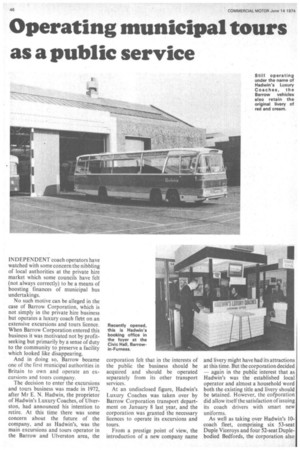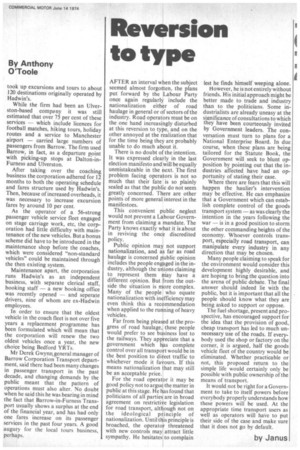Operating municipal tours as a public service
Page 48

Page 49

If you've noticed an error in this article please click here to report it so we can fix it.
By Anthony O'Toole
IN coach operators have watched with some concern the nibbling of local authorities at the private hire market which some councils have felt (not always correctly) to be a means of boosting finances of municipal bus undertakings.
No such motive can be alleged in the case of Barrow Corporation, which is not simply in the private hire business but operates a luxury coach fleet on an extensive excursions and tours licence. When Barrow Corporation entered this business it was motivated not by profitseeking but primarily by a sense of duty to the community to preserve a facility which looked like disappearing.
And in doing so, Barrow became one of the first municipal authorities in Britain to own and operate an excursions and tours company.
The decision to enter the excursions and tours business was made in 1972, after Mr E. N. Hadwin, the proprietor of Hadwin's Luxury Coaches, of Ulverston, had announced his intention to retire. At this time there was some concern about the future of the company, and as Hadwin's, was the main excursions and tours operator in the Barrow and Ulverston area, the corporation felt that in the interests of the public the business should be acquired and should be operated separately from its other transport services.
At an undisclosed figure, Hadwin's Luxury Coaches was taken over by Barrow Corporation transport department on January 8 last year, and the corporation was granted the necessary licences to operate its excursions and tours.
From a prestige point of view, the introduction of a new company name and livery might have had its attractions at this time. But the corporation decided — again in the public interest that as Hadwin's was the established local operator and almost a household word both the existing title and livery should be atained. However, the caporation did allow itself the satisfaction of issuing its coach drivers with smart new uniforms.
As well as taking over Hadwin's 10coach fleet, comprising six 53-seat Duple Viceroys and four 52-seat Duplebodied Bedfords, the corporation also took up excursions and tours to about 120 destinations originally operated by Hadwin's.
While the firm had been an Ulverston-based company it was still estimated that over 75 per cent of these services — which include licences for football matches, hiking tours, holiday routes and a service to Manchester airport — carried large numbers of passengers from Barrow. The firm used Barrow, in fact, as a departure point with picking-up stops at Dalton-inFurness and Ulverston.
After taking over the coaching. business the corporation adhered for 12 months to both the operating schedule and fares structure used by Hadwin's. Then, because of increased overheads, it was necessary to increase excursion fares by around 10 per cent.
As the operator of a 56-strong passenger vehicle service fleet engaged on stage carriage work, etc, the corporation had little difficulty with maintenance of the new vehicles. But a bonus scheme did have to be introduced in the maintenance shop before the coaches, which were considered "non-standard vehicles" could be maintained through the then existing system.
Maintenance apart, the corporation runs Hadwin's as an independent business, with separate clerical staff, booking staff — a new booking office was recently opened — and seperate drivers, nine of whom are ex-Hadwin employees.
In order to ensure that the oldest vehicle in the coach fleet is not over five years a replacement programme has been formulated which will mean that the corporation will renew the two oldest vehicles once a year, the new choice being Bedford YRTs.
Mr Derek Gwynn, general manager of Barrow Corporation Transport department, said there had been many changes in passenger transport in the past decade, and changing demands by the public meant that the pattern of operations must also alter. No doubt when he said this he was bearing in mind the fact that Barrow-in-Furness Transport usually shows a surplus at the end of the financial year, and has had only one fares increase on its passenger services in the past four years. A good augury for the local tours business, perhaps.




























































































































